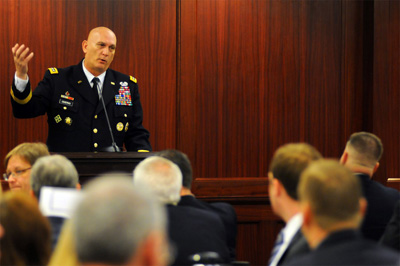New Soldiering roles for women ensure best use of talent
By C. Todd Lopez
WASHINGTON (Feb. 12, 2012) -- The Army announced Feb. 9 a broadening of opportunities for female Soldiers, something the service's chief of staff said is meant to take better advantage of all the talent in uniform.
Six new military occupational specialties have now opened to female Soldiers. Additionally, other MOSs that had been open to women only at brigade level or above will now be open to female Soldiers at the battalion level.

"To me, it's about talent management," said Gen. Ray Odierno, chief of staff of the Army. "It's about using our best talent in the best positions and I don't ever want to limit our ability and hinder the talent that we have in our Army."
Odierno spoke Feb. 9 before an audience of lawmakers, congressional staffers and Army general officers at a House Army Caucus breakfast on Capitol Hill.
While speaking to lawmakers, the general also touched on sexual assault, hazing and suicide prevention.
Sexual assault, the general said, is "absolutely inconsistent with our Army values." He told lawmakers the Army is "dedicated to establishing a campaign for awareness to change in some cases culture, to understand we are Soldiers together, and we will protect each other no matter where or when it is."
The general also said the Army is working on investigational capabilities for sexual assault and development of programs for prosecutors on how to deal with sexual assaults.
Suicide prevention has continued to be a concern for the Army. Suicide statistics published by the Army in January, for instance, showed that in 2011, there were 140 confirmed active-duty suicides, with an additional 24 under investigation.
Odierno said the Army has put a "full court press" on suicide prevention but that has made only a "marginal difference" in the suicide numbers.
"We are going to continue to work this," he said. "It's about training our Soldiers, it's about awareness, it's about identification of the signs of suicide. We'll continue to work this very hard."
Also important to Odierno is the relationship the Army has with its partners in the Asia-Pacific region. That part of the world, the general said, is home to seven of the 10 largest land armies in the world. There, he said, 22 of 28 chiefs of defense are army officers, and the predominant military force in each major country in Asia is the army.
So in Asia, Odierno said, the U.S. Army must work to strengthen its partnerships.
"We have to help to engage, build partner capacity, (and) establish military-to-military relationships as we continue to work our issues in the Asia-Pacific region," he said.
In South Korea, he said, there has been some concern about the reduction of defense spending in the United States. To address that concern, Odierno said, "we reinforce with them our commitment, our treaty commitment with them. We will be there for them if necessary."
Odierno said the Army is working to build a "strong trilateral" relationship between Korea, Japan and the United States. Acknowledging that Korea and Japan have had differences in the past, he said he's been encouraged by the growing relationship between the nations.
"We are starting to see more discussion and more agreement between the two countries and we are there to help facilitate that," he explained.
A trilateral relationship between the chiefs of staff of the three countries exists now, he said, now to continue to meet "to deal with some of the key issues that face our militaries in the region."